
Ivy Blog
Advice For Caregivers, By Caregivers in Honor of National Caregivers Day
- February 15, 2024
- Ivy Center
- Posted in Caregivers

In honor of National Caregivers Day, we’ve collected some words of wisdom for caregivers, by caregivers. No one will ever truly understand what the experience of caring for a loved one entails, until they’re placed in that situation. Embracing this, we went straight to the source to uncover the best advice to help those navigating a loved one’s diagnosis and adjusting to their new role as caregiver.
With so much emphasis placed on the needs of the cancer patient, what do you think people need to know about caring for the caregiver?
“I think for me it’s more of the acknowledgement that emotionally we are going through this journey as well.”
– Heather
“I think it’s important that people know how impactful this diagnosis is not only to the patient, but for the people who are there to care for them. That it can be emotionally tiring and scary and at some points, seemingly overwhelming. Most importantly, knowing that there are other people who can help and understand what they’re going through. It’s important that they know where the resources are.”
– Lindsay
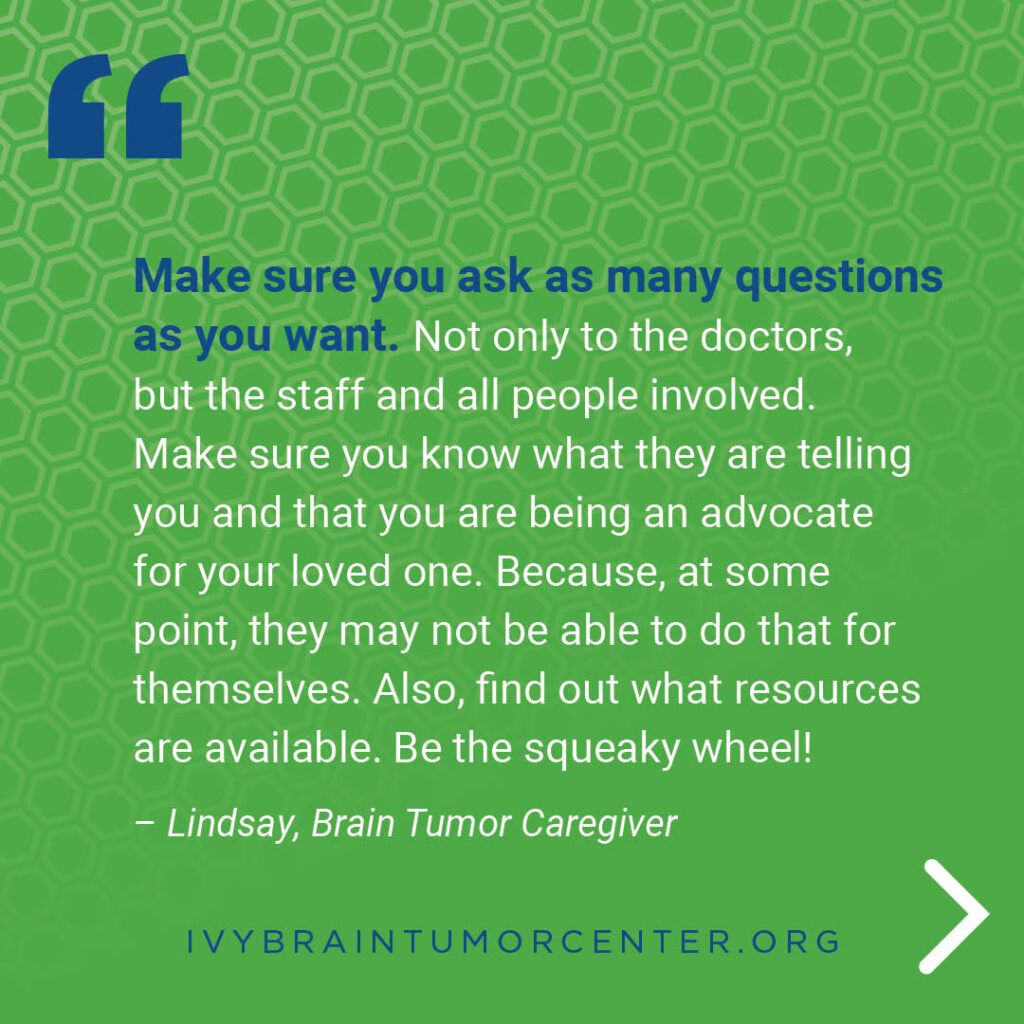
“That after being placed into a state of shock regarding a brain tumor diagnosis, the caregiver, while battling PTSD, will often be making life-changing decisions with and for their loved one. It is not easy to think about oneself with a loved one in need of all you have to give.”
– Richard
“It can be isolating and lonely at times, adding to the stress and worry you have for your loved one going through an illness and/or treatment. I’ve always appreciated when people have reached out just to check on me, or our children, to see how we’re coping with things, to offer help, or more importantly, an ear to listen or a shoulder to cry on.”
– Eileen
Do you ever experience a feeling of powerlessness? How do you find strength?
“Once you get into doing the caregiving and realize how involved it can be, you have to realize that you can only do so much and you have to realize that is good enough. The patient is not helpless in many situations and they need to do their part being as healthy as they can be, both physically and mentally, so keep as active as possible for both of you. Meditation, exercise and massage therapy is something that I do that helps me deal with the stressfulness of the situation. Socialization is important for all concerned. The patient needs to have a sense of value and assisting in their recovery is important.”
– Tom
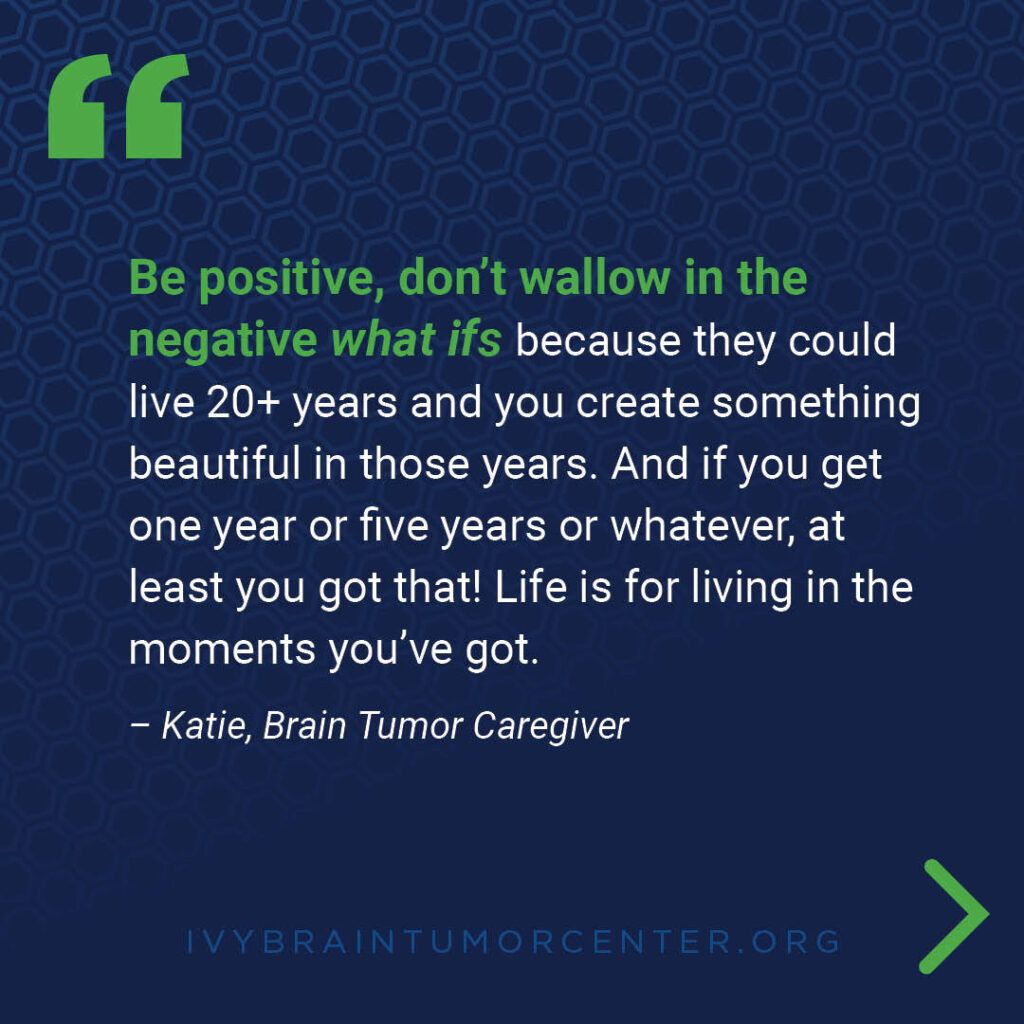
“It’s interesting that my first response to this question is that often the caregiver does not have time to dwell on feelings such as powerlessness. You set feelings aside and take actions that you pray are the best for your loved one.”
– Richard
“Caregivers have a tendency to want to do it all. Strength comes from rest and sleep to keep going.”
– Scott
“I honestly never thought that I would lose Erik in the beginning. I just felt like if we followed what the doctors recommended and kept moving forward, we would be okay. Again it’s the positive, not the negative, we looked at. Erik was and is unable to do many small tasks that we take for granted (tying shoes, changing a baby diaper, squirting toothpaste on your toothbrush with one hand can be difficult even) but I just do many of those things for him. Because I can and because I’m his wife and the mother of our children. I will be there just like he is there for me.”
– Katie
How do you manage your own needs/wants out of life while in the caregiver role?
“You have to. It depends on the caregiver situation, but in my case I had to manage because I have young children and I was in my masters program during most of the caregiving role for my mom who had a GBM. As a result, there was no time for me to think about me, I was on the back burner.”
– Lindsay
“It’s a balance. I personally live off of a calendar. Everything is scheduled. There are good days and bad days, and things can be rescheduled. It’s always important to give yourself some ‘me’ time.”
– Heather
“This is a tough one! You have to prioritize or balance your needs with that of your patient so that it is a win-win for all. I know from experience that a time table is generally set for survival or expectation for recovery, and that is how I originally adjusted my life accordingly. The time table keeps changing for the good of the patient and then you have to adjust your life accordingly again. My view is that I’m paying it forward so that when I will need help, someone will do the same for me.”
– Tom
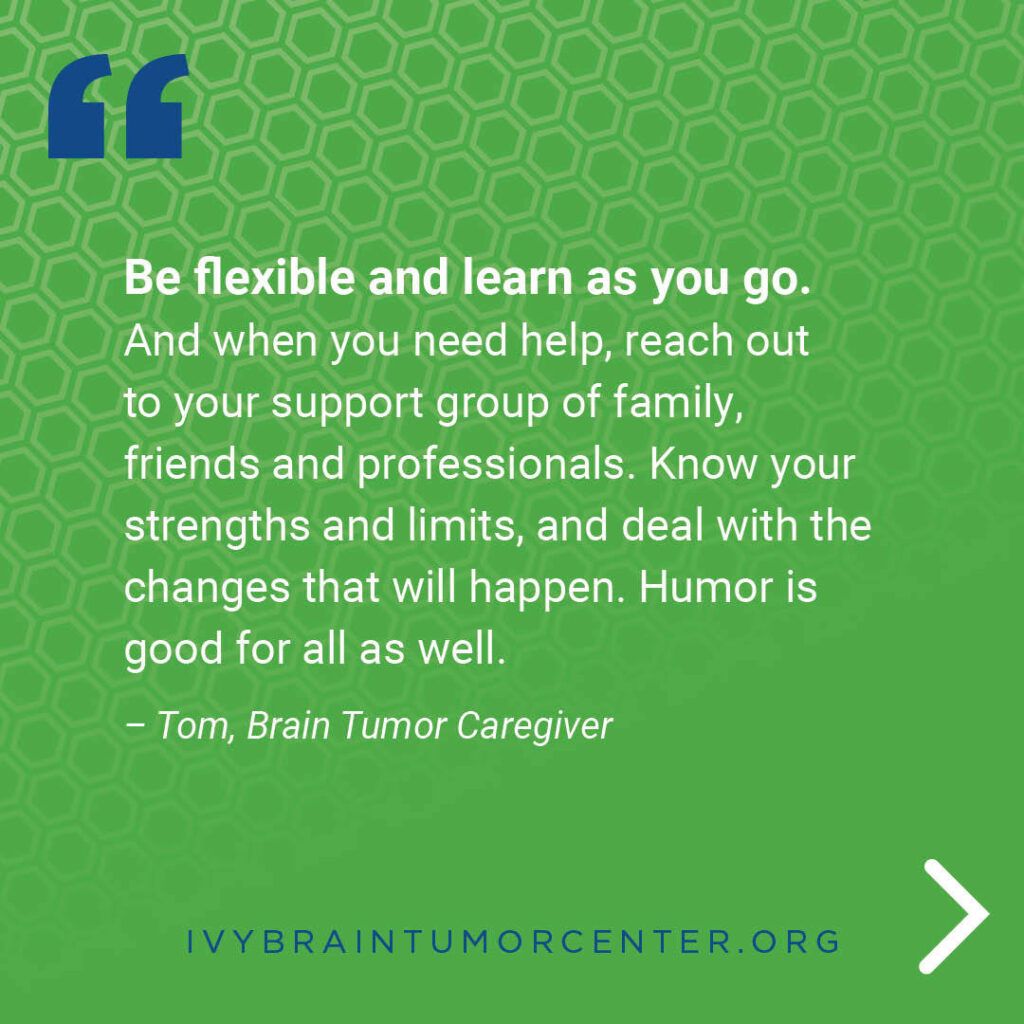
“This is a tough one, something I struggle with a lot. I wish I could honestly share that I make time for self-care, exercise, etc. but I rarely do. I think accepting help from others, and not feeling guilty about doing things for yourself is important. I’m not saying I’m good at that though!”
– Eileen
“I do what I do because I can. I have been criticized by some for doing too much over the past 20 years since he was diagnosed, but I tell them I do it because I can and because I want to. Erik and I also went through fertility issues (all three of our kids are IVF babies). The problem with our fertility was not due to Erik’s treatment either, it was all me! But Erik stepped up and came to all my appointments, he cried with me when we didn’t get pregnant and gave me the daily shots in my hip that were required when we were going through it all. He did it because he could and because I could not. We now have three beautiful children, Annie (17), Charlie and Bennett (both 13). All born after his treatment.”
– Katie
What are your best coping mechanisms to keep you able to care for your loved one?
“A day off, prayer and emotional support.”
– Kristina
“Being with my mom gave me a sense of purpose. I knew when I was with her, that I was doing something. That’s why even though the caregiver role is so difficult, it’s one that most people (I believe) would do in a heartbeat. Because feeling like you are doing something is very important.”
– Lindsay
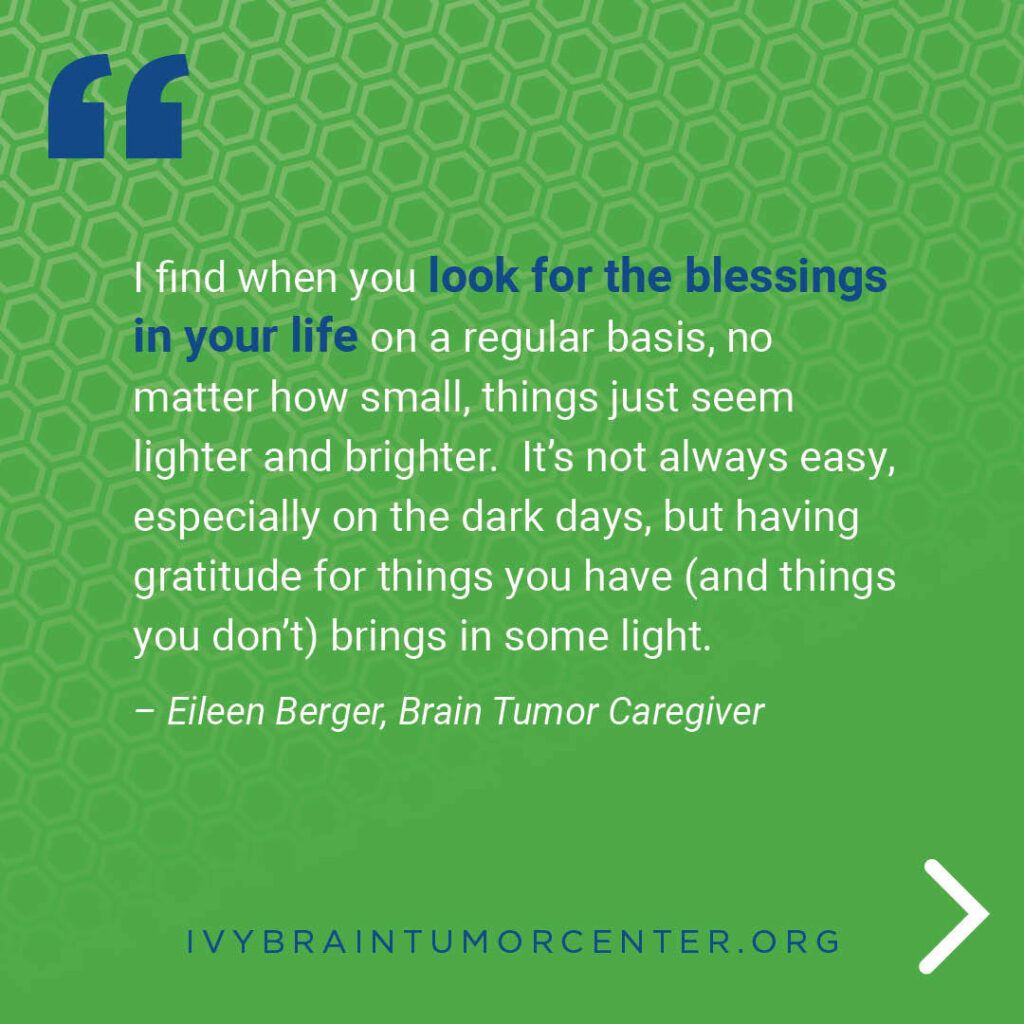
“To let things go. Not hang on to the can’ts or no’s. Move on, or nothing changes. Nothing also is EVER perfect, and that is okay. I still have moments of not being satisfied but I am a way better communicator about what it is I need than before Erik was diagnosed. It’s important to say what you need or feel, move on and let it all go.”
– Katie
“Making the most out of each day that my son was alive. Praying that research for more effective treatments would make it to the clinic. Bonding with the medical and rehab staff who understood.”
– Richard
“Meditation has helped me tremendously, helping me keep my thoughts grounded in the present. That, combined with having gratitude for even the most simple or ordinary of things, helps me feel more positive and better able to manage everything on my plate.”
– Eileen
If you had one piece of advice to give another caregiver just starting on this journey, what would it be?
“Be flexible and learn as you go. And when you need help, reach out to your support group of family, friends and professionals. Know your strengths and limits, and deal with the changes that will happen. Humor is good for all as well.”
– Tom
“Ask for help and say no to things if you need to. People will have all sorts of advice — listen to it, but pick a path that works for your situation because everyone is different. What works for some, may not work for others.”
– Heather
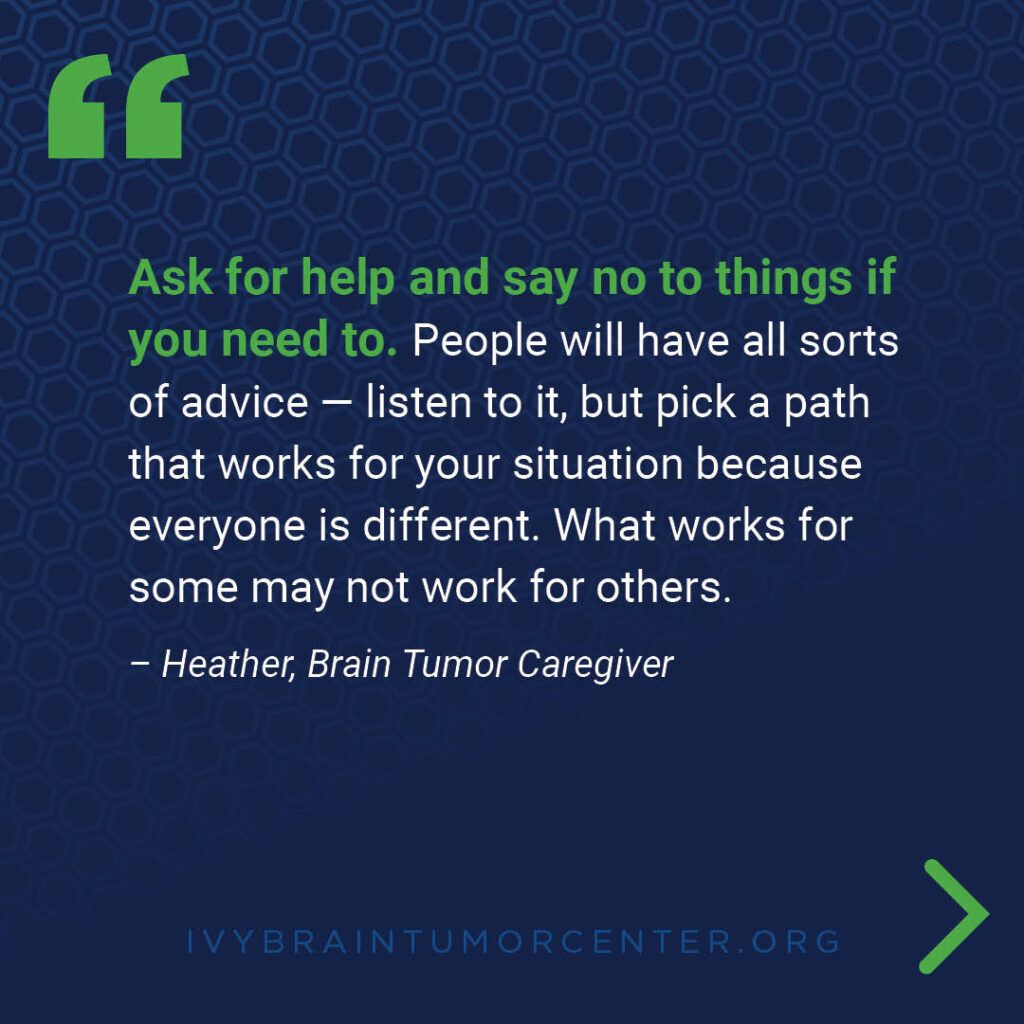
“Make sure you ask as many questions as you want. Not only to the doctors, but the staff and all people involved. Make sure you know what they are telling you and that you are being an advocate for your loved one. Because, at some point, they may not be able to do that for themselves. Also, find out what resources are available. Be the squeaky wheel!”
– Lindsay
“Be positive; don’t wallow in the negative what ifs because they could live 20+ years and you create something beautiful in those years. And if you get one year or five years or whatever, at least you got that! Life is for living in the moments you’ve got. I’m grateful for 33 years with Erik and hoping for lots more!”
– Katie
“We have a sign in our house that I bought for myself right after my husband’s diagnosis and subsequent surgery and treatment. It reads “Gratitude Changes Everything.” I find when you look for the blessings in your life on a regular basis, no matter how small, things just seem lighter and brighter. It’s not always easy, especially on the dark days, but having gratitude for things you have (and things you don’t) brings in some light.”
– Eileen
Lanette Veres of the Gray Matters Foundation, our official patient support partner, helped acquire these responses from the vast network of caregivers she has provided support to over the years. We want to thank her and all of the caregivers for taking part and providing advice and words of encouragement to those new to this experience.
